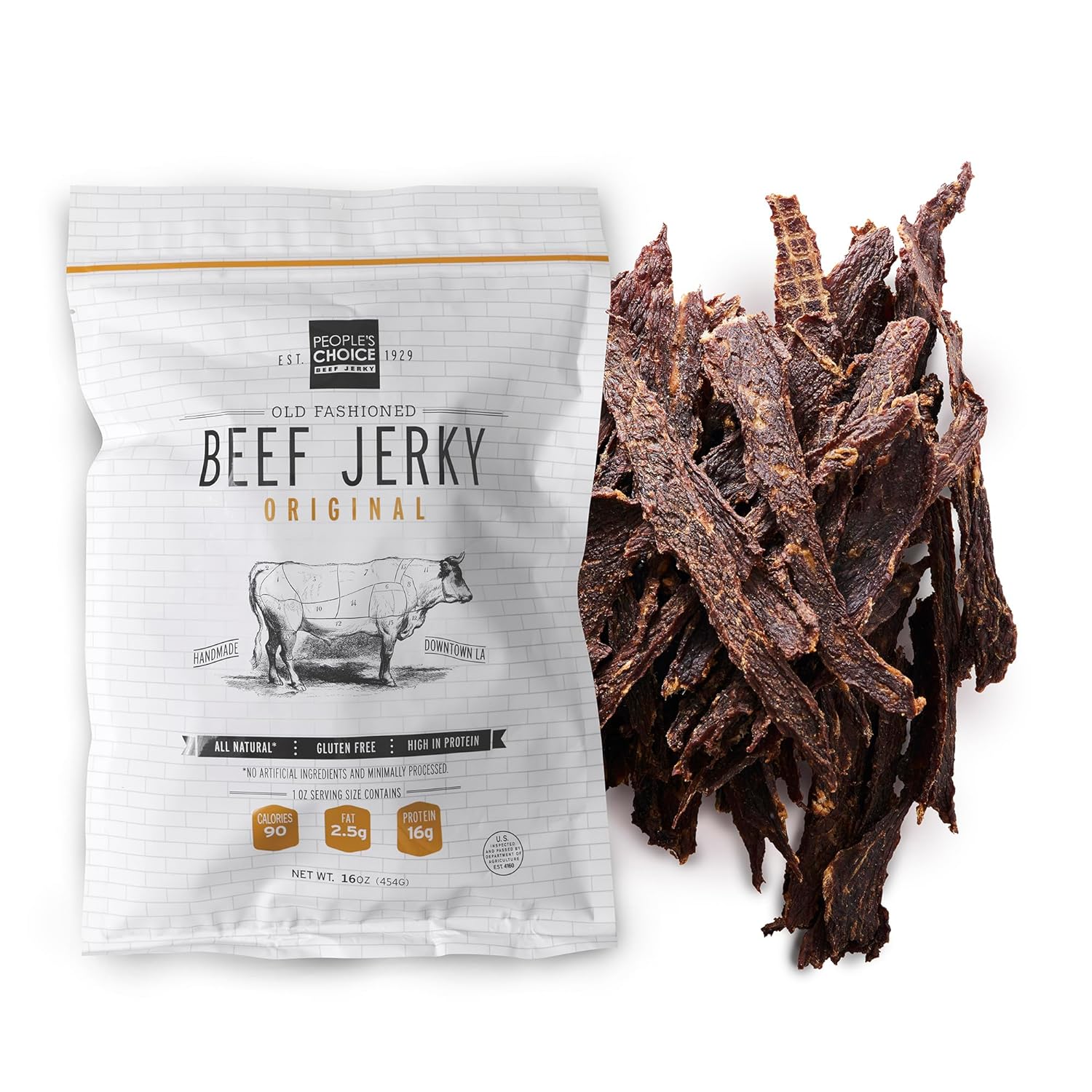Understanding Beef Jerky Nutrition
Is beef jerky healthy? When considering beef jerky as a snack option, it’s essential to understand its nutritional content. Beef jerky is a source of high-quality protein, providing essential amino acids necessary for muscle repair and growth. A single serving can offer a significant protein boost with relatively low calorie and fat content, which can be particularly appealing to those trying to increase their protein intake without consuming excessive calories. However, it is also high in sodium, which is used generously in the curing process. For individuals monitoring their sodium intake due to blood pressure or heart health concerns, this could be a potential downside. Additionally, while some fat is trimmed in the preparation of beef jerky, it still contains saturated fats, although in smaller amounts compared to other snacks.
The Benefits of Protein-Rich Snacks
Protein is a vital macronutrient, and snacks rich in protein, like beef jerky, provide several health benefits. They can help keep you feeling full longer, reducing the need for frequent snacking and potentially aiding in weight management. Protein is also crucial for muscle synthesis and repair, making beef jerky a favorite among athletes and fitness enthusiasts. It can serve as a convenient post-workout snack that helps to repair and build muscle tissues after strenuous exercise. Furthermore, as body tissues undergo daily wear and tear, protein-rich foods contribute to their maintenance, ensuring that the body’s repair processes are functioning optimally.

Considering the Role of Sodium in Jerky
While beef jerky offers a convenient protein kick, it’s important to account for its sodium levels. Excessive sodium in the diet is linked to high blood pressure, heart disease, and stroke. The curing process of beef jerky involves salt to prevent bacterial growth, which means that a single serving can provide a substantial chunk of the recommended daily sodium intake. For those already consuming a diet high in processed foods, adding high-sodium beef jerky could exacerbate potential health issues related to sodium. As such, individuals should be mindful of their overall daily sodium consumption and consider lower-sodium jerky options or enjoy it in moderation to mitigate health risks.
Weighing the Pros and Cons
The Presence of Preservatives and Additives
The commercial production of beef jerky often involves preservatives and additives to enhance flavor and prolong shelf life. Common preservatives like sodium nitrate are used to maintain the color and freshness of the jerky but have been controversial due to potential health risks, including a possible link to certain types of cancer. Various flavoring agents and sugar can also be added, contributing additional calories and potentially impacting blood sugar levels. When choosing beef jerky, it’s advisable to read labels carefully and select brands that minimize these additives or opt for natural or organic varieties that focus on using whole-food ingredients.

Impact on Diet and Lifestyle Choices
Individuals following specific dietary or lifestyle protocols may find beef jerky a convenient and beneficial snack. Those adhering to low-carb or ketogenic diets will appreciate beef jerky’s high protein and low carbohydrate content, making it a fitting option. Moreover, since beef jerky is portable and non-perishable, it becomes an excellent snack for on-the-go individuals, outdoor enthusiasts, or anyone without immediate access to refrigeration or cooking facilities. However, those following plant-based diets or with ethical concerns regarding meat consumption will naturally exclude beef jerky from their dietary choices. For such individuals, alternative plant-based jerky made from ingredients like mushrooms, soy. Or seitan provides a similar texture and protein content without the use of animal products.
Healthy Consumption Tips for Jerky Lovers
For those who enjoy beef jerky and wish to include it as part of a healthy diet, there are several tips to follow. Moderation is key; enjoy beef jerky in appropriate portion sizes to avoid overconsumption of protein and sodium. Look for brands that use grass-fed beef, as it may contain more omega-3 fatty acids and antioxidants compared to conventional beef. Additionally, choose varieties that are low in sodium and free from added sugars and preservatives. Pairing beef jerky with high-fiber foods such as fruits or nuts can create a more balanced snack that includes additional nutrients. Lastly, integrating beef jerky into a diet rich in fruits, vegetables, whole grains. And healthy fats will help ensure that you’re getting a wide range of nutrients for overall health.
Evaluating Health Claims
The Role of Quality Ingredients in Jerky
The nutritional value and healthiness of beef jerky are also influenced by the quality of the ingredients used in its production. Premium brands that use organic, grass-fed beef not only support better animal welfare and environmental practices but may also offer a healthier product. Grass-fed beef is often leaner and contains higher levels of certain nutrients, such as omega-3 fatty acids and conjugated linoleic acid. Which have been associated with heart health benefits. Additionally, quality jerky producers may avoid harmful additives and opt for natural preservatives such as vinegar or celery juice, which carry fewer health risks. When choosing beef jerky, selecting brands that prioritize the use of high-quality. Natural ingredients can lead to a healthier snack option that aligns with nutritional goals.

Balancing Jerky in a Diverse Diet
Incorporating beef jerky into a balanced diet requires consideration of overall dietary patterns. Jerky can be a valuable source of protein in moderation, particularly for those with active lifestyles needing convenient energy sources. However, a healthy diet should be diverse, including a variety of protein sources such as legumes, dairy, eggs, fish, and poultry, along with ample fruits, vegetables, and whole grains. Including beef jerky as one of many protein options ensures a broader spectrum of nutrients and reduces reliance on any single food item. This dietary diversity reduces the risk of overexposure to sodium and certain additives unique to jerky while promoting a more holistic approach to nutrition.
Listening to Your Body’s Responses
Individual reactions to beef jerky can vary based on personal health considerations and sensitivities. Listening to one’s body and observing any adverse effects after consuming jerky. Such as bloating or elevated blood pressure, is critical. For those sensitive to sodium or certain preservatives, it may cause discomfort or exacerbate existing health conditions. In such cases, it’s vital to adjust consumption accordingly or find alternative snack options that better suit one’s health profile. Consulting a healthcare provider or a dietitian can provide personalized advice on incorporating beef jerky into your diet. Taking into account your specific health requirements and lifestyle.

Making Informed Choices
Educating Yourself on Processing Techniques
How beef jerky is processed can play a significant role in its healthiness. Traditional drying methods, like air drying or smoking, can imbue the jerky with flavor without necessarily relying on added sugars or artificial flavor enhancers. Modern commercial processes, however, often involve the use of additional ingredients to accelerate production and increase shelf life. By educating oneself on different processing techniques and their impact on health. Consumers can make informed decisions when selecting beef jerky products. Brands that utilize minimal processing and emphasize natural preservation methods typically produce a more wholesome and health-conscious product.
The Importance of Portion Control
Even when opting for high-quality beef jerky, portion control is essential to maintain its status as a healthy snack. Excessive consumption can lead to an imbalance in protein intake and an overload of sodium, negating the benefits associated with moderate jerky consumption. Paying attention to serving sizes and limiting intake to the recommended portion can help to manage calorie, fat, and sodium intake effectively. By doing so, beef jerky can be a satisfying snack that does not disrupt an otherwise balanced and nutritious diet.

The Bottom Line: Moderation and Mindfulness
Ultimately, whether beef jerky is considered healthy depends on the context of overall dietary habits and individual health goals. As with most foods, moderation and mindfulness are the keys to incorporating it into a diet healthfully. Choosing products made with quality ingredients, being aware of sodium contents, avoiding excessive preservatives. And consuming in appropriate portions are all practices that will influence the health contributions of beef jerky. When enjoyed as part of a varied and nutrient-rich diet. Beef jerky can be a convenient and beneficial snack, satisfying cravings while delivering essential proteins and flavor.


